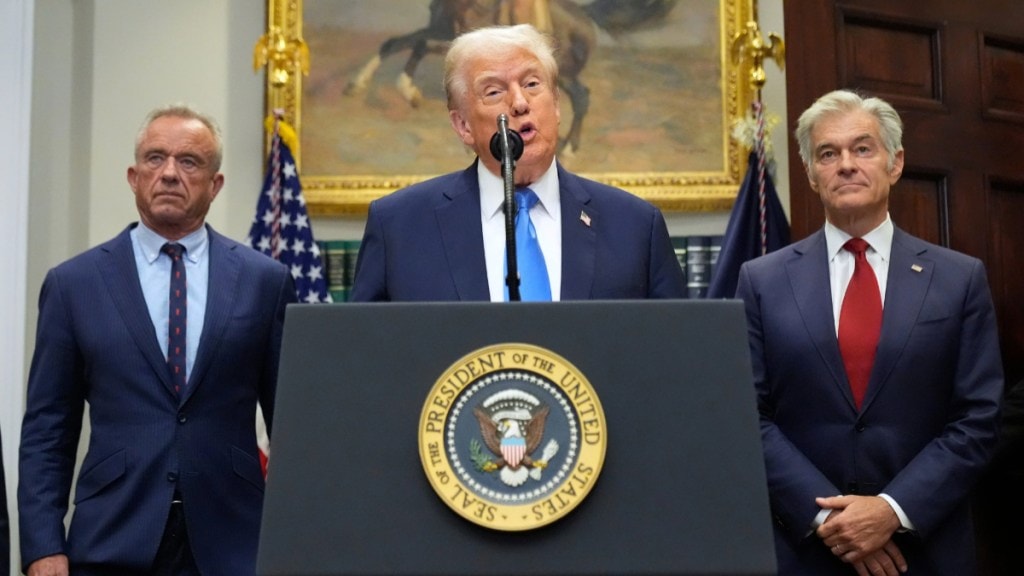US Supreme Court will hear arguments regarding the legality of President Donald Trump’s tariff policy on Wednesday. The case focuses on whether the president has the authority to impose tariffs on imports from various countries, a power traditionally reserved for Congress.
The legal dispute is on the tariffs imposed by Trump during his presidency under the International Emergency Economic Powers Act (IEEPA), a 1977 law that grants the president the authority to declare national emergencies and take economic actions in response. However, lower federal courts have ruled that Trump exceeded his authority under the IEEPA when imposing these tariffs.
The case, Learning Resources, Inc. v. Trump, is crucial because it challenges whether the president can unilaterally set tariffs without congressional approval. These tariffs were imposed on imports from multiple nations, including China, Canada, Brazil, and India, as part of government’s trade policy.
Arguments against the policy
Experts argue that the IEEPA does not explicitly grant the president the power to impose tariffs. Neal Katyal, the attorney representing those challenging the tariffs, argues that the word “tariff” is not mentioned in the IEEPA statute, and there is no legal basis for such sweeping presidential powers under the law.
Katyal asserts in an interaction with NPR, “The idea that every president had this power all along, presidents Reagan to Obama and none of them knew it and all of them have been spending all this time negotiating with Congress to try and get tariff authority when they had it from the start, is just too fanciful to believe.”
He added that under the US Constitution, the power to tax and set tariffs rests with Congress, not the president. Katyal draws on the nation’s historical opposition to such unchecked authority, referencing the Boston Tea Party and the Revolutionary War as evidence of the dangers of unilateral taxation.
“The idea that you can tax Americans through the monarch’s decision alone is as foreign to our Constitution and our traditions as anything I have ever seen,” he told NPR.
Experts’ prediction on the verdict
Legal and trade experts are divided on the likely outcome of the case. Henrietta Treyz from Veda Partners told NPR that there is a 50% to 65% chance that the Supreme Court will side with the lower courts and rule that the president does not have the authority to impose the tariffs.
Terry Haines from Pangaea Policy told Yahoo Finance, believe the Court is more likely to rule in favour of the tariffs, although he notes that the decision may not be a straightforward “yes or no.”
Haines points out that Trump’s administration has repeatedly invoked the IEEPA to declare economic emergencies and impose tariffs as a response.
However, the current case only addresses the specific tariffs imposed under the IEEPA and does not concern other forms of tariffs imposed under different legal authorities, such as Section 232 tariffs on steel and automobiles.
Trump’s justification for the tariffs
President Trump, however, states that the tariffs are necessary to address what he perceives as national emergencies, such as persistent trade imbalances and the ongoing flow of fentanyl into the United States. Trump’s legal team maintains that the tariffs are a critical tool to protect both US national security and the economy.
Trump’s administration has repeatedly argued that the tariffs are justified under the IEEPA, as they are intended to protect US economic and national security interests.
As reported by NPR, president’s Solicitor General, D. John Sauer, warned that invalidating the tariffs could have catastrophic consequences for US national security, foreign policy, and the economy “were the Supreme Court to invalidate the tariffs, it would have catastrophic consequences for our national security, foreign policy, and economy.”
White House prepares for the outcome
While the White House has expressed confidence that the Supreme Court will rule in Trump’s favour, press secretary Karoline Leavitt stated that the administration is preparing for alternative outcomes.
She stated, “The White House is always preparing for Plan B… but we are confident and hopeful that the Supreme Court will do the right thing.”
The Senate has recently shown signs of discontent with Trump’s tariffs. Last week, the Senate voted to terminate tariffs on imports from Brazil and Canada, with several prominent Republican senators joining Democrats in opposing the tariffs. While these moves are largely symbolic, they reflect growing bipartisan pushback against Trump’s trade policies.
Trump has argued that the tariffs are essential for the economic security of the US.
He took to social media on Tuesday to emphasise the importance of the case, claiming, “Tomorrow’s United States Supreme Court case is, literally, LIFE OR DEATH for our country. With a Victory, we have tremendous, but fair, financial and national security. Without it, we are virtually defenceless against other Countries who have, for years, taken advantage of us. Our stock market is consistently hitting Record Highs, and our Country has never been more respected than it is right now.”
He believes that the tariffs have contributed to the nation’s strong economy and the deals negotiated with other countries.

